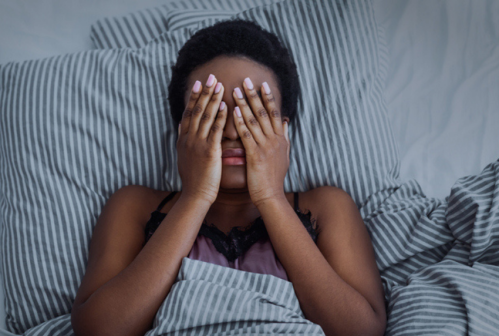Waking Up To Pee at Night? Here’s What a Urologist Wants You To Know
Generally, you shouldn't have to get up to pee during the night time, and people who do might be experiencing nocturia.

Getting up to pee during the night can be super disorienting. It turns out that it can give you some insight into your health. To be clear: Getting up to go to pee every once in a while is perfectly fine, according to Heather Jeffcoat, DPT , Fusion Wellness & Femina Physical Therapy in Los Angeles, California. But if you’re waking up to pee (and you’re not on medication like a diuretic) it might help to examine what’s going on.
Experts in This Article
board-certified urologist and medical director of Urology Cancer Specialists in Los Angeles
doctor of physical therapy, owner of Femina Physical Therapy, and author of Sex Without Pain
Frequently waking up to pee at night is actually called nocturia, and “for those suffering from this condition, these nighttime wake-up calls maybe once a night or more,” says S. Adam Ramin, MD, a board-certified urologist and medical director of Urology Cancer Specialists.
Once in a while, nocturia is pretty normal, and in some cases, so is once-a-night nocturia. For instance, people over the age of 45 might just consider this a part of life. Other factors like bladder muscle function, postpartum life changes, cardiovascular health, neurological conditions can influence urination urgency throughout the night. Still, the more times a person gets up to void their bladder each night, the more severe the nocturia is considered to be, Dr. Ramin says. “Once the bladder fills up close to capacity, it will instinctively want to contract to empty itself. This is a natural reflex of the bladder muscle. However, our brains have learned from childhood to inhibit these natural contractions until we are in the bathroom,” Dr. Ramin adds.
People can develop nocturia for a whole host of reasons. Some of the reasons, according to Dr. Jeffcoat, are mechanical or based on the literal musculature function of the bladder and pelvic floor. “In my practice, I see nocturia mostly in postpartum individuals, especially when they are frequently getting up to breast or bottle-feed,” Dr. Jeffcoat says. She explains that sometimes nocturia persists because someone has been primed to wake up at regular intervals throughout the night— and it continues even after they’re no longer breastfeeding. This is a necessity and pretty normal. She adds that pelvic floor trauma incurred during birth can be a possible culprit.
Another factor, Dr. Jeffcoat says, is constipation. Constipation can cause nighttime urination because built-up fecal matter in the colon can press on the bladder and instill urgency strong enough to wake you up, she explains. And if you have bladder control and incontinence trouble throughout the day, it isn’t uncommon to have those carry into the night, Dr. Jeffcoat adds. “It’s essential to manage daytime frequency to help with nighttime frequency through behavioral retraining techniques that a pelvic floor therapist could show you.”
If you’re peeing during the nighttime quite often, Dr. Jeffcoat recommends that you head to your provider to discuss the issue. Reasons for a decrease in bladder muscle function can be attributed to UTIs, overactive bladder, diabetes, pelvic prolapse, or other more complex neurological and cardiovascular conditions that a doctor could identify and begin to treat.
“Our heart and vascular system have to successfully pump blood to the kidneys for the kidneys to filter the blood and produce urine during the waking hours,” Dr. Ramin explains. “If our cardiovascular system fails to pump enough blood to the kidneys, then the body tends to retain a great deal of fluid during the daytime.” He adds that nocturia can, therefore, sometimes be a sign of a weakened cardiovascular system; however, nocturia isn’t the only symptom. He shares that you might also notice swollen limbs, irregular heart symptoms, water retention, and general weakness. In short: nighttime bathroom breaks won’t be your biggest concern.
Additionally, since your bladder is controlled by your brain, there are a few neurological disorders that can impact bladder function. Disease processes that affect brain function include dementia, Parkinson’s disease, brain tumors, history of brain stroke, radiation to the brain, brain surgery, and sleep apnea, Dr. Ramin says. However, again, it’s important to remember that nocturia isn’t the primary symptom in these cases.
What to if you’re dealing with nocturia
It’s safe to say that the bladder can sometimes be like Rome, in that all roads lead it to it. There are so many bodily processes that can affect your bladder and how you pee. If you’re dealing with some nighttime urination, you might keep a bladder diary of your overall habits. Consult a professional about your fluid intake, medication side effects, and any other factors that seem relevant. It’s very possible that the nightly tea that you drink could be the culprit, so taking notes can help you get and a doctor get to the bottom of it. Both Dr. Jeffcoat and Dr. Ramin stress that the best course of action is to get in touch with a trusted medical professional if you’re concerned about peeing at night. And to try to pee before you sleep and try to avoid drinking water right before bed.
Oh hi! You look like someone who loves free workouts, discounts for cutting-edge wellness brands, and exclusive Well+Good content. Sign up for Well+, our online community of wellness insiders, and unlock your rewards instantly.
Sign Up for Our Daily Newsletter
Get all the latest in wellness, trends, food, fitness, beauty, and more delivered right to your inbox.
Got it, you've been added to our email list.










